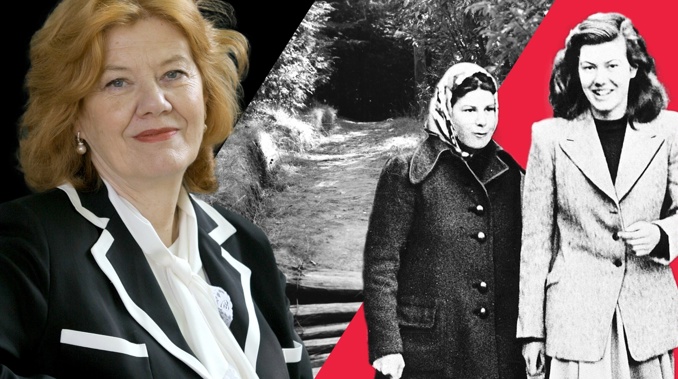
Seventy years after Pauline Parker and Juliet Hulme were convicted of one of New Zealand’s most brutal and high-profile murders, senior journalist Anna Leask speaks exclusively to Juliet’s brother Jonathan about the impact of the crime and her life beyond prison.
It was a crisp Tuesday afternoon in June when teenagers Pauline Parker and Juliet Hulme attacked Pauline’s mother Honorah on a secluded walkway at Victoria Park on Christchurch’s Port Hills.
With “animal ferocity” they hit her over and over again with a brick inside a stocking. Police would later tell the court that the 46-year-old had been “battered to pieces”.
After a controversial trial, the girls were found guilty of murder - a jury rejecting their claims of insanity.
The case made headlines around the world, its infamy elevated in the 90s with the release of Sir Peter Jackson’s movie Heavenly Creatures.
 Pauline Parker (left) and Juliet Hulme on the way to a preliminary court hearing in 1954. Photo / Christchurch Star
Pauline Parker (left) and Juliet Hulme on the way to a preliminary court hearing in 1954. Photo / Christchurch Star
For almost 70 years Jonathan Hulme stayed silent about his sister, her crime and her life after prison.
But after she died in 2023 he felt a growing compulsion to share another side of her story.
Juliet Hulme carved out a new life as a prolific and best-selling crime novelist under the name Anne Perry.
But under her meticulously constructed public facade, Jonathan said his sister remained the “damaged individual” she was when she helped to murder her best friend’s mother.
“I was her brother for 79 years and her personal assistant for 22 and I regard myself as being in a unique position to make a significant contribution - especially as we are coming up to the 70th anniversary of that infamous murder and trial,” he said.
“She was a complex character and no doubt a talented writer. But there remained a streak of dishonesty and selfishness in her ... She did not regard herself as being psychotic or being mad, but it was pretty clear to me looking at it.
“My hope is that we can get a balanced but correct and realistic portrayal of Anne, good and bad.”
My sister the murderer
Jonathan Hulme remembers the day Honorah Parker died.
His “bossy” older sister with the “wonderful imagination” had gone out for the day with her best - and by then only - friend.
“Quite often when I saw her, there was Pauline hanging around,” he said.
She was “a bit of a dark, unresponsive character”.
“I never related much to her. I don’t remember much of Pauline, she tended to be in the background and didn’t communicate much to me. That’s the way she was.”
He was in his bedroom listening to the radio - 3ZB, a weekly programme featuring Robert Fabian, a famous Scotland Yard detective.
“My dad came in and he said ‘I have some important news I better tell you - there’s been a terrible accident. I’m afraid while Juliet and Pauline were out with Pauline’s mother, there was a terrible accident and Pauline’s mother has been killed,” Jonathan said.
Henry and Hilda Hulme with Juliet and Jonathan soon after they arrived in Christchurch. Photo / NZWW November 1948
“My dad came back a few days later and told me that in fact, it wasn’t an accident that she’d been killed - and my sister and Pauline were responsible for killing her.
“It took me a while to sort of figure out what that meant - but I could put that together.”
By the time the trial started, Jonathan and his father had left New Zealand and he would not see his sister again for almost six years.
“My dad kept me informed all the time about what was happening ... what happened to her was pretty darn brutal. For a 15-year-old girl to go to the toughest prison in the Southern Hemisphere - it is to her credit that she survived that.
“She went through some pretty tough times. Lesser people would have pulled the plug on themselves, or given up. She didn’t.”
Juliet Hulme in the Ilam garden a year before the murder. Photo / Christchurch Star-Sun
In the beginning
Pauline Parker and Juliet Hulme met at Christchurch Girl’s High School in the 1950s.
Juliet and Jonathan had emigrated with their parents Henry and Hilda from England when their father was appointed Rector at the University of Canterbury.
Pauline was born and raised in Christchurch - her father managing a fish shop and Honorah running the family home as a boarding house.
As children both girls had spent lengthy stints in hospital - Pauline with a crippling bone infection that almost killed her, and Juliet with repeated bouts of tuberculosis.
As a result they were exempt from sport and as their classmates played hockey and basketball Pauline and Juliet bonded over their shared love of writing and reading.
 Pauline Parker in a school photo not long before the murder. She is in the back row, second from the right - the only girl with her head down. Photo / Supplied
Pauline Parker in a school photo not long before the murder. She is in the back row, second from the right - the only girl with her head down. Photo / Supplied
Soon they were inseparable, spending hours creating a fantasy world - in which Pauline became “Gina” and Juliet, “Deborah” - with intricately detailed storylines.
They invented their own religion, saints and version of heaven - a parallel dimension called The Fourth World - and planned to run away to Hollywood, where they envisaged their fantasy stories would be made into Hollywood movies, and they would become famous actresses.
At first, their parents welcomed the friendship, but the increasing codependency and intimacy of the friendship began to concern the adults.
In May 1953 the teens were separated when Juliet was again hospitalised with tuberculosis.
She was bedbound for 112 days, during which she and Pauline exchanged letters at a prolific pace - vivid and fantastical writings where they assumed different characters and played out storylines.
In September, Juliet was finally deemed well enough to go home and the friendship resumed with the same intensity as before.
By late November, the Parkers sent Pauline to a psychiatrist, worried about her rapid weight loss.
Her doctor stated the condition was due to her “homosexual attachment” to Juliet, which prompted an ultimatum from Honorah - if Pauline’s health did not improve, she could not see Juliet.
“The thought is too dreadful. Life would be unbearable without Deborah … I wish I could die,” Pauline wrote in her diary.
The final straw
Over the next few months, the girls were thrown into an emotional maelstrom as the Hulmes announced the break-up of their marriage and their intention to return to the UK.
Hilda had started a new relationship with Bill Perry and Henry had resigned from his job.
It was settled he would return to London imminently, taking Juliet with him. Hilda and Bill would follow with Jonathan at the end of the school term.
Juliet and Pauline leaving the Christchurch Magistrate's Court in the weeks after the murder. Photo / Green & Hahn Photography Ltd.
The girls were devastated and campaigned relentlessly for Pauline to move abroad with Juliet.
Not surprisingly, the response from Pauline’s mother Honorah was an unyielding “no”.
In early June 1954 the teens had become so desperate that they embarked on a lethal plan, which Pauline wrote about in her diary. The diary entries were later presented to the jury at the girls’ trial.
-February 13: She is so unreasonable. Why could mother not die?
-April 28: Anger against mother boiled up inside me. It is she who is one of the main obstacles in my path. Suddenly a means of ridding myself of the obstacle occurred to me.
-April 29: I am trying to think up some way…I do not want to go to too much trouble but I want it to appear either a natural or an accidental death.
-June 19: We have worked it all out and are both thrilled with the idea. Naturally we feel a trifle nervous but the anticipation is great.
Horror on the hill
June 22, 1954.
Eleven days before Juliet was due to leave New Zealand.
The last day of Honorah Parker’s life.
Juliet went for lunch at the Parker’s home, and Honorah had agreed to take the girls for a walk in the Port Hills.
They took a bus from Cathedral Square to Victoria Park and, after a cuppa at the tearooms, the trio set off.
Half an hour later the girls came sprinting back to the cafe, shrieking, hysterical and bloody.
“Please could somebody help us? Mummy has been hurt ... she’s terribly hurt, she’s dead,” Pauline screamed.
Juliet cried: “She’s hurt, she’s covered in blood, please somebody help”.
“She slipped on a plant and hit her head on a brick … her head kept bumping and banging as it fell,” said Pauline.
View of the crime scene, Victoria Park. Just below the bank of left is where the body was found. There is also a pool of blood on the right. Photo / Green & Hahn Photography Ltd.
A caretaker ran down the track to investigate and the police were called.
When they got to the scene they quickly ascertained Honorah’s death was no accident.
Marks on her neck indicated she’d been held down as she was battered; she had severe defensive wounds to her hands; and the ultimate proof - the blood and gore-covered brick in the stocking near her body.
“The deceased had been attacked with an animal ferocity seldom seen in the most brutal murders,” said Detective Sergeant Archie Tate.
“Her head had literally been battered to pieces.”
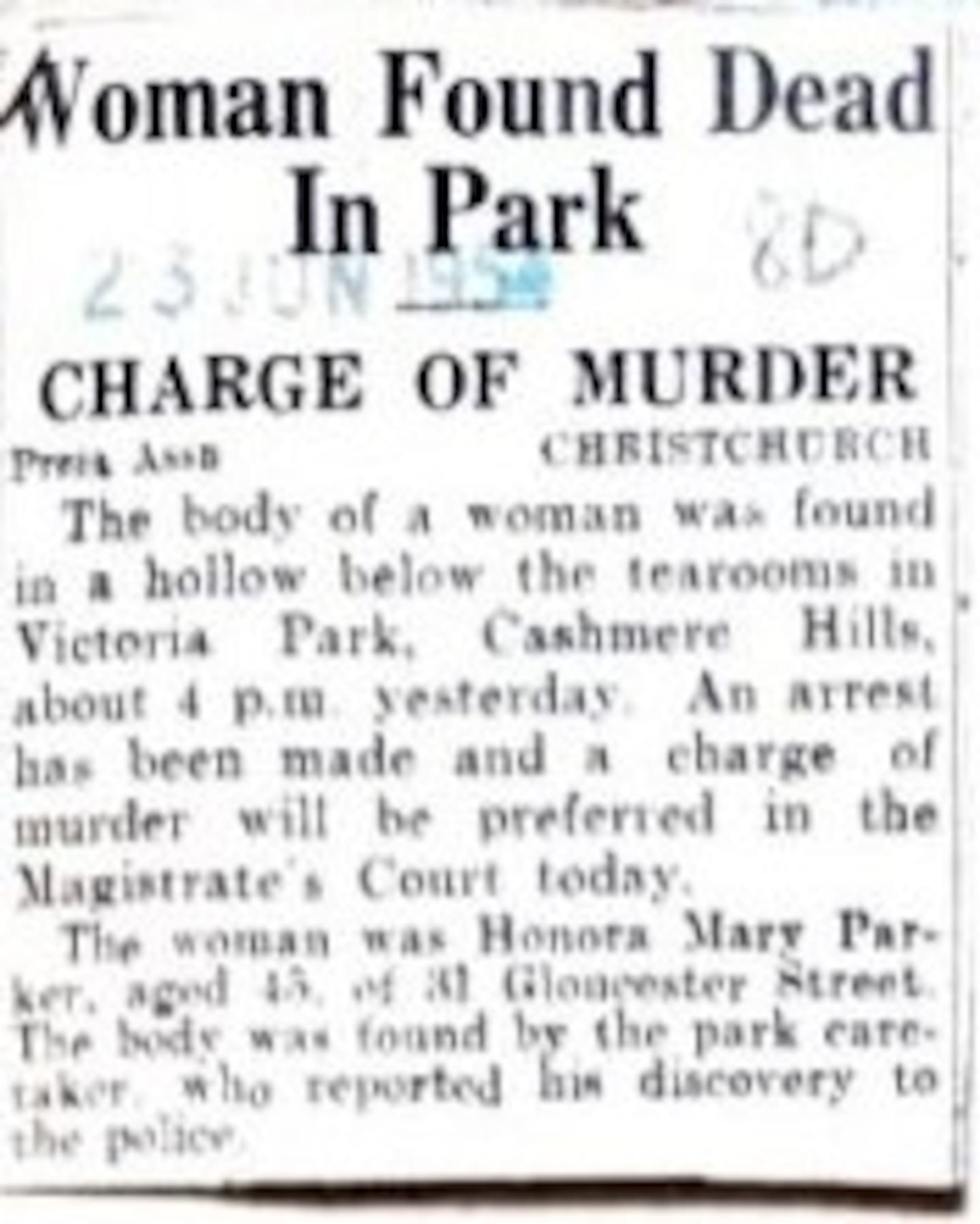 x
x
Pauline’s confession: I regretted it but I couldn’t stop
The teenagers were gone by the time police arrived - Henry had collected the girls and taken them back to the Ilam house where they were bathed, fed and put to bed with a sedative and soothing music.
Later that night detectives interviewed both girls. Their statements were later presented as evidence in court and published in media at the time.
Initially they had the same story - Honorah had fallen and hit her head repeatedly on a rock.
Then Juliet, after prompting from her family, stated she had not actually seen what had happened as she had been walking ahead.
Detectives then told Pauline they suspected she had killed Honorah - and they had reason to believe Juliet was not there when it happened.
In a bid to keep her beloved friend out of trouble, Pauline made a full confession admitting she had decided to kill Honorah “a few days ago” and hit the woman “a good many times” around the head with the brick.
“I wish to state that Juliet did not know of my intentions and she did not see me strike my mother. I took the chance to strike my mother while Juliet was away; I still do not wish to say why I killed my mother,” she said.
“As soon as I started to strike my mother I regretted it but could not stop then.”
 The infamous photograph of Pauline Parker released after the murder. Photo / Supplied
The infamous photograph of Pauline Parker released after the murder. Photo / Supplied
The 15-year-old was taken to the police station and charged with murder.
Soon after police noticed her writing furiously on a piece of scrap paper - which turned out to be a diary entry recording that on June 22 she had successfully carried out the “moider”.
“The Hulmes have been wonderfully kind and sympathetic. Anyone would think I’d been good. I’ve had a pleasant time with the police, talking nineteen to the dozen and behaving as though I hadn’t a care in the world,” she wrote.
“I haven’t had a chance to talk to Deborah properly, but I am taking the blame for everything.”
Pauline’s actions prompted police to seize her diaries from the family home - the most recent contents shocking.
-April 30 1954: I told Deborah of my intentions and she is rather worried but does not disagree violently.
-June 20 1954: We discussed our plans for moidering mother and made them a little clearer. Peculiarly enough I have no (qualms of) conscience.
-21 June 1954: I rose late and helped mother vigorously this morning Deborah rang and we decided to use a brick in a stocking rather than a sand-bag. We discussed the Moider fully. I feel very keyed up, as though I were planning a surprise party. Mother has fallen in with everything beautifully and the happy event is to take place tomorrow afternoon. So next time I write in this diary Mother will be dead. How odd – yet how pleasing.
-22 June 1954: Day of the happy event. I am writing a little of this up in the morning before the death. I felt very excited and ‘The night before Christmas ish’ last night. I did not have pleasant dreams though. I am about to rise.”
Pauline appeared in court at 10am the next day.
 Pauline's last diary entry before the murder. Photo / Supplied
Pauline's last diary entry before the murder. Photo / Supplied
Police went back to the Hulme house later in the day to speak to Juliet again, her friend’s diary entries leaving investigators without any doubt she was equally responsible.
By the end of the day Juliet had also confessed.
“I had part of a brick ... I had got it from the garage ... I gave it to Pauline … the brick was put in the stocking at her house,” she said.
“After the first blow was struck I knew it would be necessary for us to kill her.”
The next morning Juliet appeared in court charged with murder.
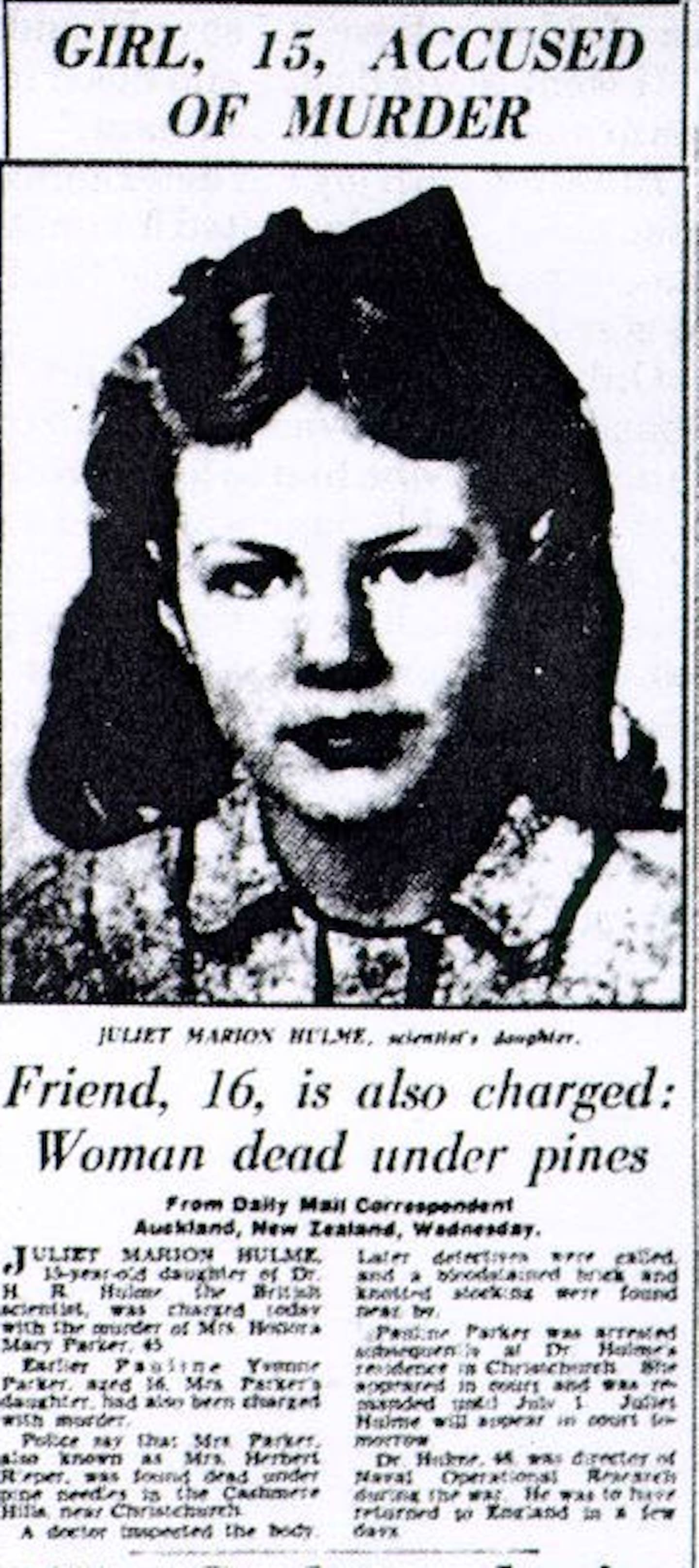 Newspaper coverage of the murder in 1954. Photo / Supplied
Newspaper coverage of the murder in 1954. Photo / Supplied
The killer teens’ trial
Just 62 days after Honorah died the girls went on trial in the Supreme Court at Christchurch.
The Crown argued murder. The defence argued insanity.
“They are not incurably insane - they are incurably bad,” the prosecutor said.
“The behaviour of the two accused may have been shocking, unusual and their deed a most dreadful one, but both the accused knew what they were doing when they battered Mrs Parker to death, that what they were doing was wrong, and they were by all medical and legal standards perfectly sane.
“The contention of the prosecution is that this plainly was a coldly, callously planned and premedicated murder committed by two highly intelligent but precocious and dirty-minded little girls.”
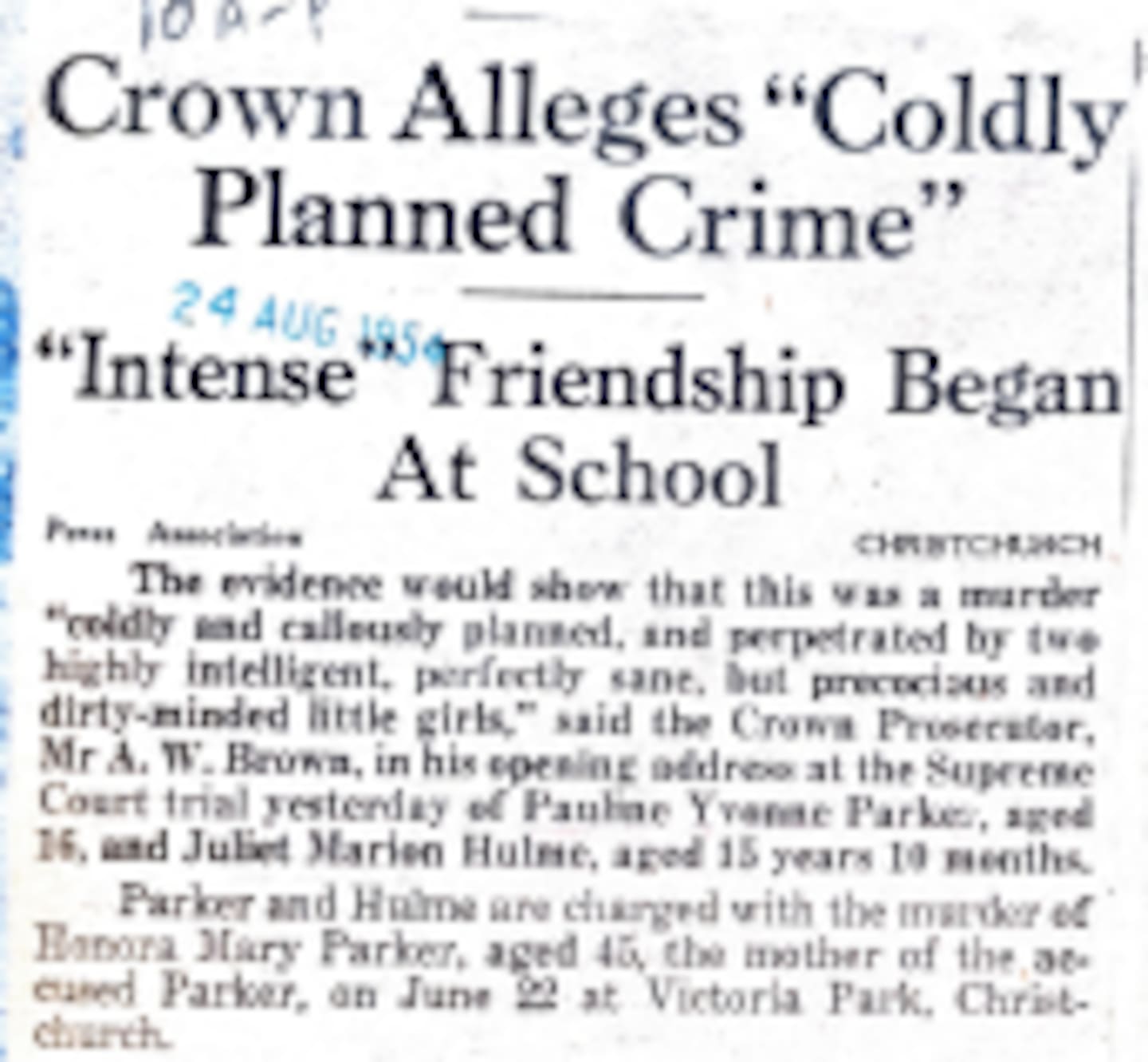 The first day of the trial was covered by media from all over the world. Photo / NZH
The first day of the trial was covered by media from all over the world. Photo / NZH
The defence maintained the pair had a rare shared psychotic disorder known as folie à deux - characterised by two or more people in a close relationship having the same delusion.
Both girls were both mentally unwell on their own, but their intense and “morbidly close” relationship accelerated their fatal actions.
“They were incapable of forming a moral judgment on what they did … these girls are mentally ill, sick adolescents - not brutal criminals,” said Juliet’s lawyer.
The jury heard from three experts - internationally renowned psychiatrist Reginald Medlicott and Dr Francis Bennett for the defence and Dr Kenneth Stallworth for the Crown.
Medlicott firmly supported the folie à deux diagnosis, and concluded the girls were “grossly insane” when they killed Honorah, paranoid with an “inability to appreciate the rights of others”.
Before the trial, he had told a colleague he had never encountered such “pure evil”.
Bennett said the only explanation for the murder was mutual insanity.
He opined the girls were labouring under major psychosis; paranoid, having delusions and obsessed with their plan to kill Honorah and could see nothing beyond it.
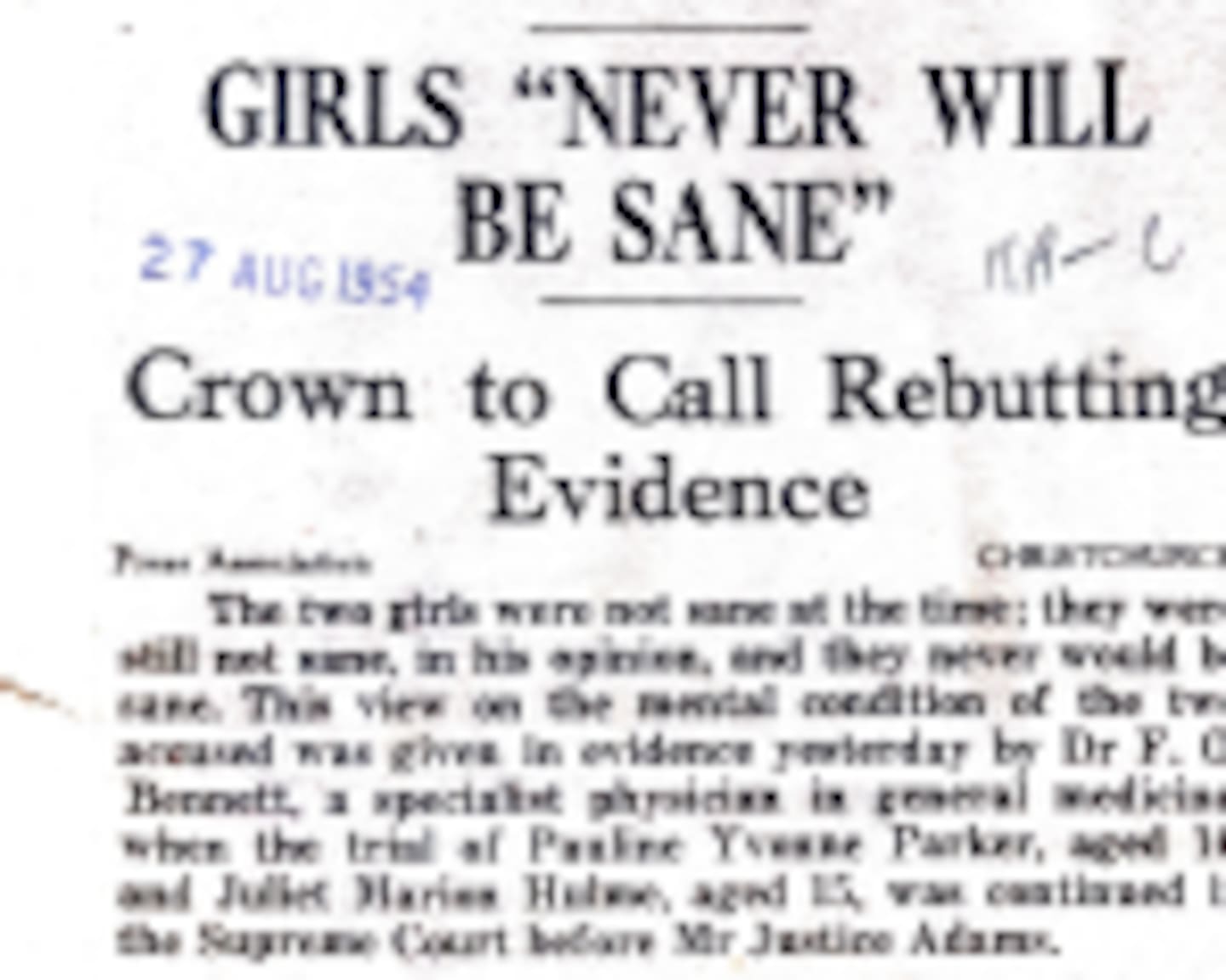 The trial was controversial with experts divided on the girl's sanity. Photo / NZH
The trial was controversial with experts divided on the girl's sanity. Photo / NZH
He explained that the relationship between the girls was “vital” to them and “only in that do they feel secure”.
“Had it never been threatened, they might have continued their morbid infatuation without any gross trespass against society. But it was threatened … and they acted out to resist the threat.
“(They were) a thousand miles away from sanity. They did not think (killing Honorah) was wrong. They knew it was against the law of the country but they had another loyalty which was much more persuasive to them ... the loyalty to a delusion.”
Stallworth - like the others - said it was clear the teens knew their actions were wrong.
However he concluded neither girl had any disease of the mind - and in his opinion, the defence of insanity should be ruled out.
The evidence was completed by 5pm on Friday August 26 and Justice Frances Adams asked the jury to return Saturday to hear closing addresses and his summary. Then they would be sent to deliberate.
The judge’s orders were met with dismay. On Saturday afternoon Canterbury was set to defend the coveted Ranfurly Shield against Waikato. Many of the jurors, lawyers and court staff had planned to be on the sideline to watch the game.
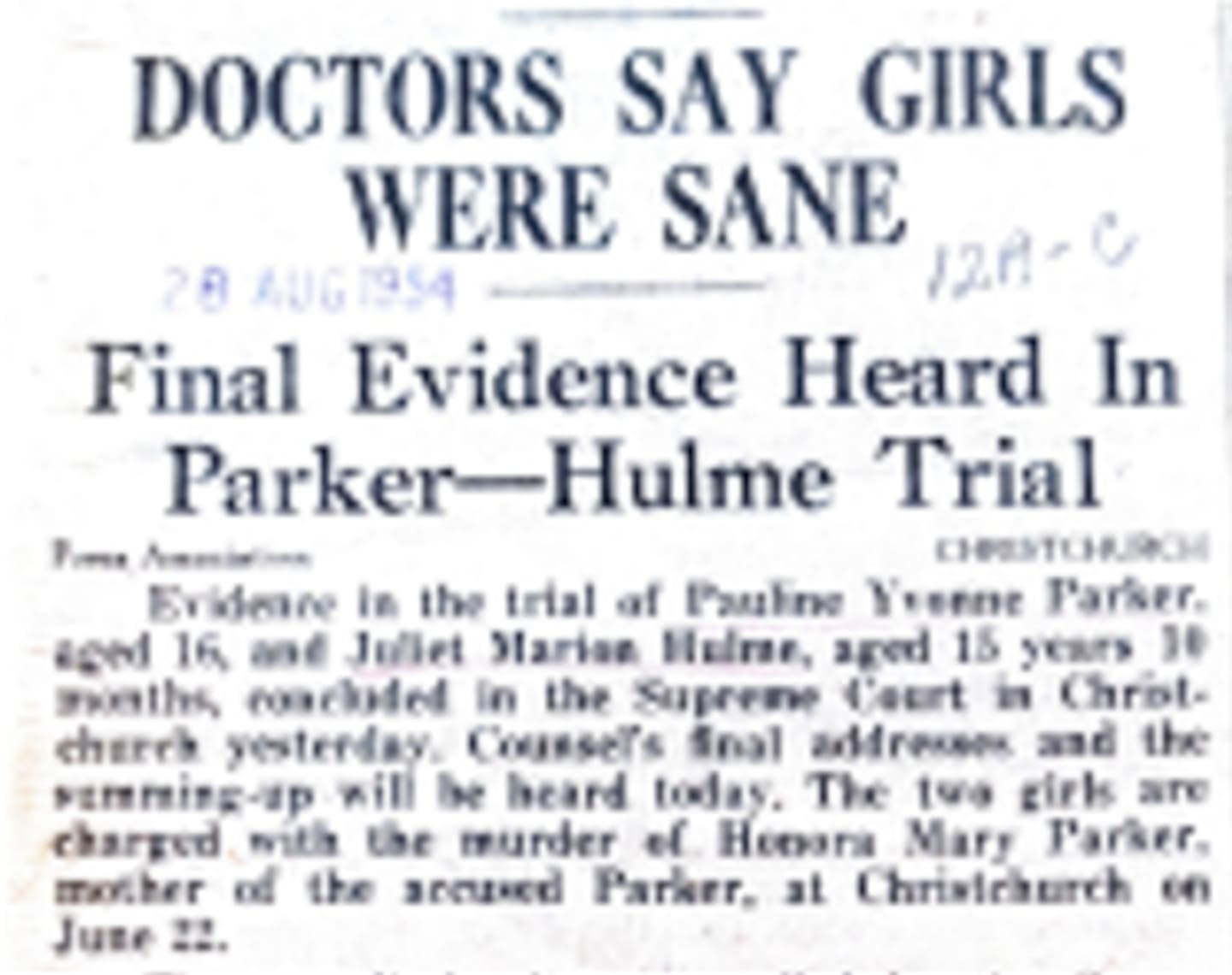 The trial started just 62 days after Honorah Parker died. Photo / NZH
The trial started just 62 days after Honorah Parker died. Photo / NZH
One of the defence lawyers would say years after the trial that he felt the judge’s call to continue on Saturday was a plot to rush their decision.
Justice Adams then indicated to the lawyers he was considering taking the insanity defence off the table - that given all the experts agreed Pauline and Juliet knew their actions were wrong and punishable, they could not be found insane.
Lawyers for both the girls and Crown strongly protested, and Justice Adams allowed the defence - but he was very clear to the jury in his summing up that he had heard no evidence that the girls were insane in any legal sense.
And, he said, if the jury could not find that evidence - it was their duty to convict.
“Two doctors express the opinion that they were insane. On the other side, three sanity. It is the overall picture you must consider,” he said.
“It has not been denied at any stage that the accused are guilty of the crime ... the burden of proof with insanity does rest with the defence.”
It took the jurors just two hours to reach a verdict.
Pauline and Juliet were both found guilty of murder.
 Coverage of the guilty verdict in the Herald. Photo / NZH
Coverage of the guilty verdict in the Herald. Photo / NZH
Prison, parole and pseudonyms
The young killers spent five-and-a-half years in prison - Pauline mainly in Christchurch and Juliet starting at Mt Eden, then known as the harshest prison in the Southern Hemisphere.
In December 1959 the Minister of Justice confirmed both killers had been released on parole a month earlier - the announcement was delayed to give them a chance to start afresh.
The Parole Board said the murder was the result of a “one-in-a-million chance friendship that went terribly wrong”.
Effectively, had they never met - Honorah would still be alive.
Neither girl underwent any formal rehabilitation or psychiatric treatment during their time behind bars.
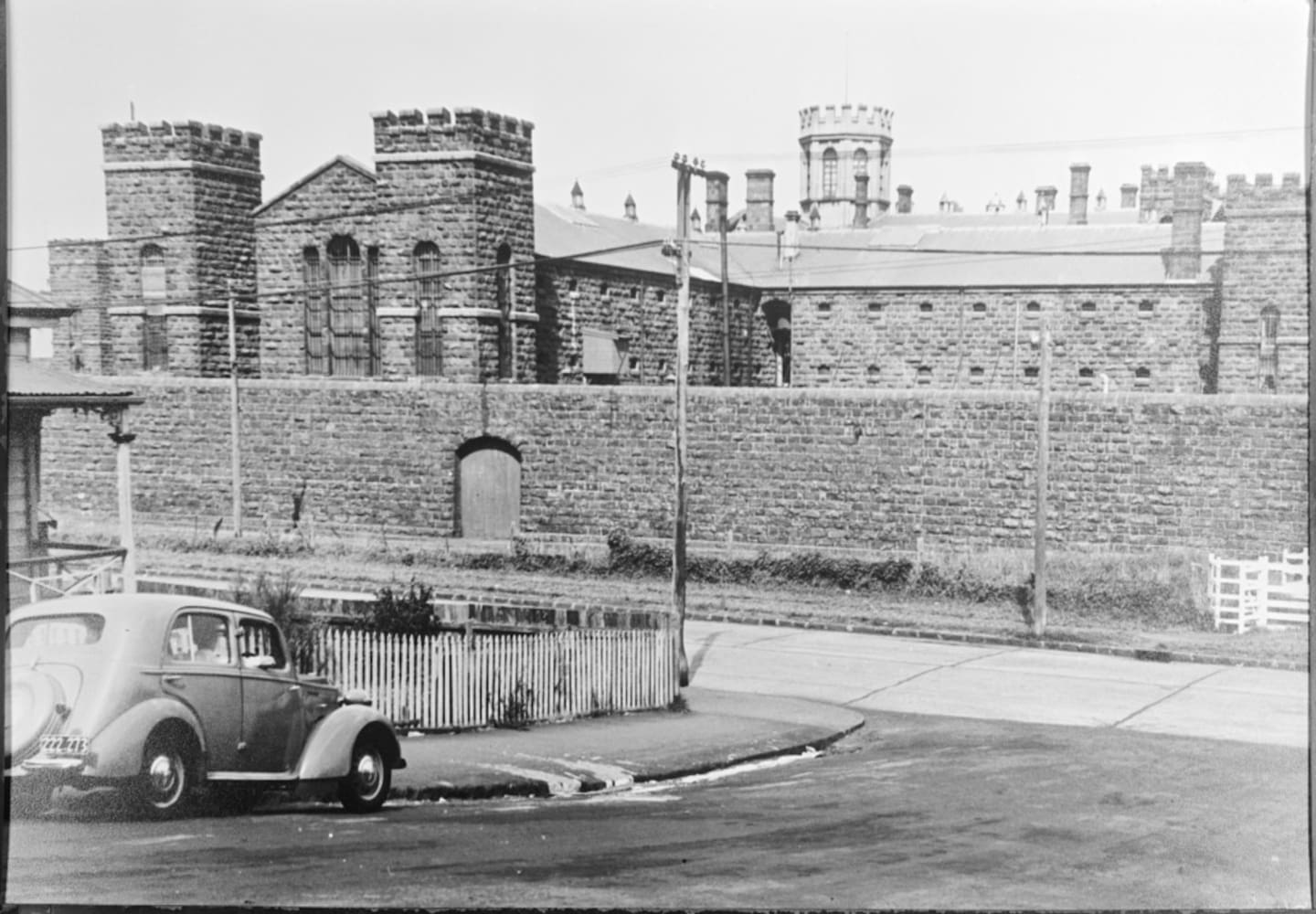 The old Mount Eden Prison where Juliet Hulme was sent for the first part of her sentence. Photo / Supplied
The old Mount Eden Prison where Juliet Hulme was sent for the first part of her sentence. Photo / Supplied
Juliet left New Zealand immediately with her new passport in the name of Anne Steward.
Pauline - who became Hilary Nathan - stayed in New Zealand and was subject to parole conditions.
In prison, she had become deeply religious and wanted to become a nun. She entered a convent after her release but was not suited to the life.
She had studied in prison, so continued her education on the outside and became a qualified librarian, living and working in Wellington and then Auckland.
When her parole period ended, she quietly slipped out of New Zealand to start a new life in the UK.
As of this year there was no official record of her death and it is thought she is living in a remote village in Scotland’s Orkney Islands.
Jonathan Hulme said his sister’s return was awkward. He had not heard directly from her since her arrest and was at college when she appeared back in his life.
“Obviously, she was somebody who was now in a completely different environment and trying to find a beat. So everyone was a little bit cautious, a little bit wary,” he said.
“But she was my sister, and we had a natural bond.
“It took a bit of time for her to develop ... And then it was a question of just getting to know her. We didn’t talk about the past, then. I think we [were] too busy trying to establish the present and look to a future.”
 Melanie Lynskey (left) as Pauline Parker and Kate Winslet as Juliet Hulme in Peter Jackson's Heavenly Creatures.
Melanie Lynskey (left) as Pauline Parker and Kate Winslet as Juliet Hulme in Peter Jackson's Heavenly Creatures.
Jonathan said his sister’s crime had a deep impact on his family and he experienced “moments of unhappiness and anger” over the years.
“I think I was at times ... I was angry. I was unhappy for my parents’ sake. This was the biggest nightmare that you could possibly have as a parent,” he said.
“They knew there was something wrong with the relationship with Pauline and that it was getting toxic but never in a month of Sundays would they have believed it would end in murder. It was horrendous.”
Jonathan went on to study medicine while Juliet worked “odd jobs”.
“We got on well ... we did become closer. But she did her thing and I had my life to lead,” he said.
“It took her a while to establish herself and get her self-confidence back.
“She went over to America, to LA. It was her lifelong dream that they [Juliet and Pauline] were going to go to Hollywood and be accepted and famous. It was an absolute fantasy, but my sister tried to make it real by going to Los Angeles.
“Nothing ever really happened. She came back to England ... and she carried on writing ... that’s all she ever really wanted to do, and everything else was sort of marking time until she got accepted.
“It was Bill Perry that suggested she write a novel that was in the time of Jack the Ripper - so she did that. And this was the first book that actually got anywhere.
 Anne Perry's first published book. Juliet Hulme had always wanted to be a writer and this title was picked up in 1979. Photo / Anne Perry
Anne Perry's first published book. Juliet Hulme had always wanted to be a writer and this title was picked up in 1979. Photo / Anne Perry
“They eventually got round to make a television version of it. We got some decent actors and everything, and she actually got a walk-on part in it. She was quite chuffed with that. It did quite well, but it never really took off.
“Ever since then, Juliet was hoping, hoping, hoping that there would be a silver screen version of the books that she had written. That never happened.”
Anne Perry became a prolific author, selling 20 million books by 2006, and she travelled the world speaking at events.
For years nobody other than that inner circle knew anything about her past life.
But that all changed in 1994 when news of the movie Heavenly Creatures - the title coming from a poem Pauline scrawled in one of her diaries - began to spread.
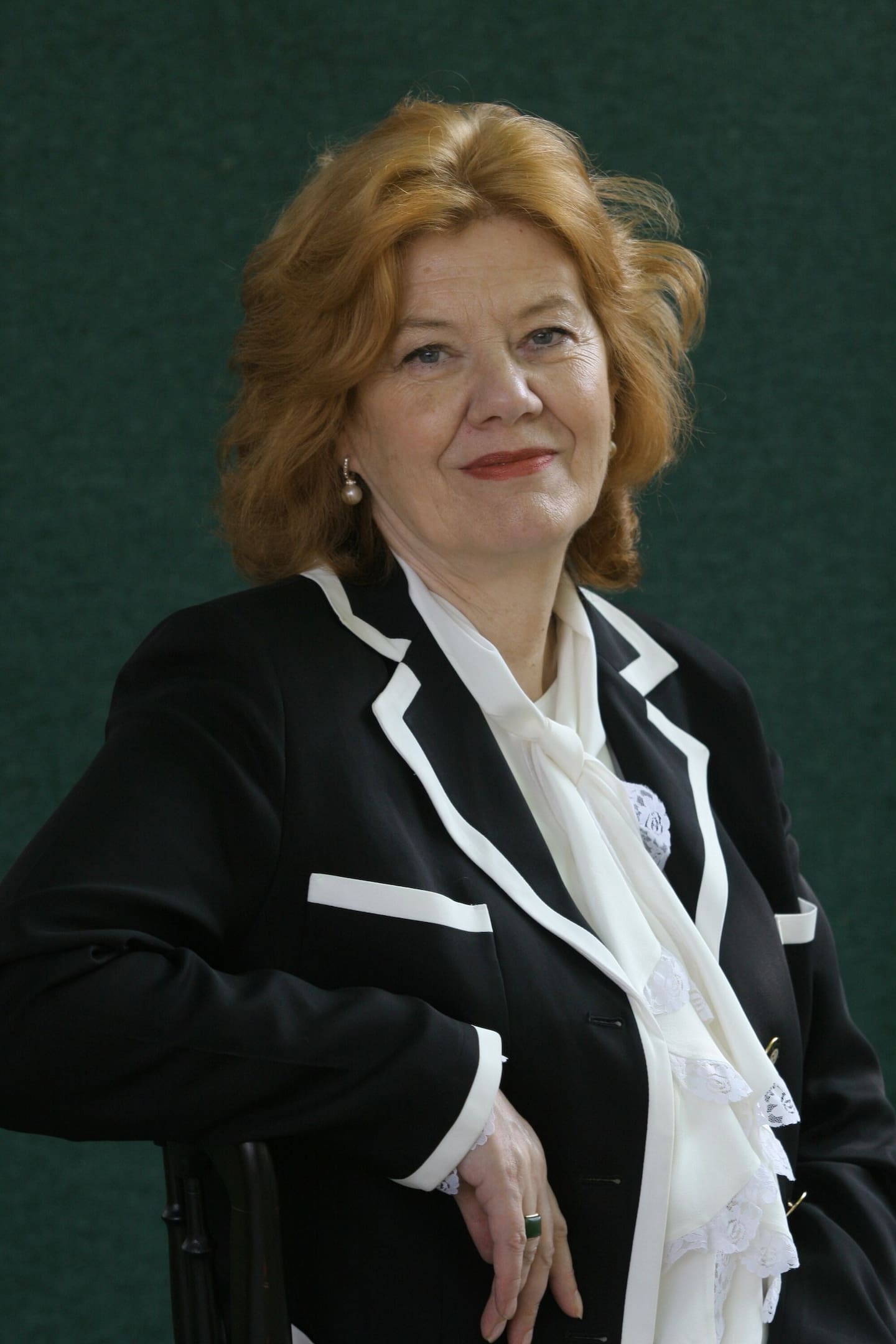 Anne Perry. Photo / Getty Images
Anne Perry. Photo / Getty Images
The phone call that ended the secrets
When the link between Perry and the murder - revealed by a New Zealand journalist - hit headlines, it was a difficult time for her family.
“I heard about it from my mum, who went through a terrible time,” Jonathan said.
“And I think damn nearly killed my mother - she was in her 80s ... Frankly, at the time, the press weren’t particularly nice. But mum rode it out, Juliet rode it out and afterwards, she said ‘well, all the secrets are out now, there’s nothing for me to hide.’
“In many ways, it was a relief. It was uncomfortable while it happened, but she looked back at it and said: ‘well, I’m glad it’s all out now. I have nothing to fear’.”
Jonathan said over the years his sister had boyfriends and several marriage proposals but she could never settle down with anyone while she had such a deep secret.
Once she was outed, Juliet carried on with her writing, her career as an author unimpacted by the revelation.
While sometimes she would give a brief insight into her prison stint, she generally avoided speaking about the murder and trial.
In 2002 she agreed to be interviewed by author Ian Rankin. The interview was featured in Rankin’s 2002 television documentary Evil Thoughts.
“When I was 15, I committed a crime as an accessory; I was involved,” she said.
Rankin asks: “What was this specific crime, Anne?
Juliet: “I helped someone kill another person ... Their mother.”
Rankin: “This was a friend of yours? Was the mother awake, asleep?
Juliet: “Oh, she was awake.”
Rankin: “What did you do, you jumped on her or something?
Juliet: “Yes ... I felt I had no time to find a better solution.”
Jonathan was always sceptical about his sister’s telling of the events.
“It was one of her mantras which was trotted out regularly that she did what she did because she feared Pauline would commit suicide … but there was very slender evidence of that,” he said.
“It was almost as if she believed it was noble of her to dispose of the mother - to save Pauline’s life. It wasn’t murder, but ‘moider’ - it was sanitised and the moral value of it reversed.
“Did she act to preserve Pauline’s life? No. She was a teenager wrapped up, absorbed with the moment, not thinking it through … In many ways, she was just as psychotic in later life as she was earlier.”
Jonathan took a job with his sister when he moved his family back to the UK in the mid-2000s.
Both of his children were nearing university age and he wanted to work again as a doctor. But his sister needed a personal assistant and he accepted the role, staying on for more than two decades.
“It was a good job ... I’d come up there in the morning, get the emails off, print them off, take them to her. We would write the comments, discuss it, then I’d reply. And there’ll be various research things for me to do,” he said.
 Jonathan said working with his sister was "a good job". Photo / Screenshot from Anne Perry Interiors
Jonathan said working with his sister was "a good job". Photo / Screenshot from Anne Perry Interiors
“We’d have lunch together at one o’clock and work through the afternoon. She would be back up in her office writing away. And I’d be on the computer or reading books … I had plenty to do.”
Jonathan avoided the media until his appearance in the documentary Anne Perry, Interiors - promoted as an inside look at the famed writer’s life.
But he was not able to be authentic, he felt. It was yet another occasion where everyone involved had to stick to his sister’s script, her rules of engagement.
Again, Jonathan watched as she “trotted out” her narrative that minimised her involvement, how she was “frightened” of Pauline and “absolutely trapped” into killing Honorah.
“I was doing something I knew it was wrong and I knew I would have to pay for it and I knew it was stupid, but I was terrified that she really would take her life and it would be my fault,” she said.
“I felt if I couldn’t walk away, I would have given anything I had to be able to somehow get out of it. But I didn’t see a way and I couldn’t go to my mother and I couldn’t go to my father ... I did something stupid, which I’ve regretted for the rest of my life … but I can’t undo it.”
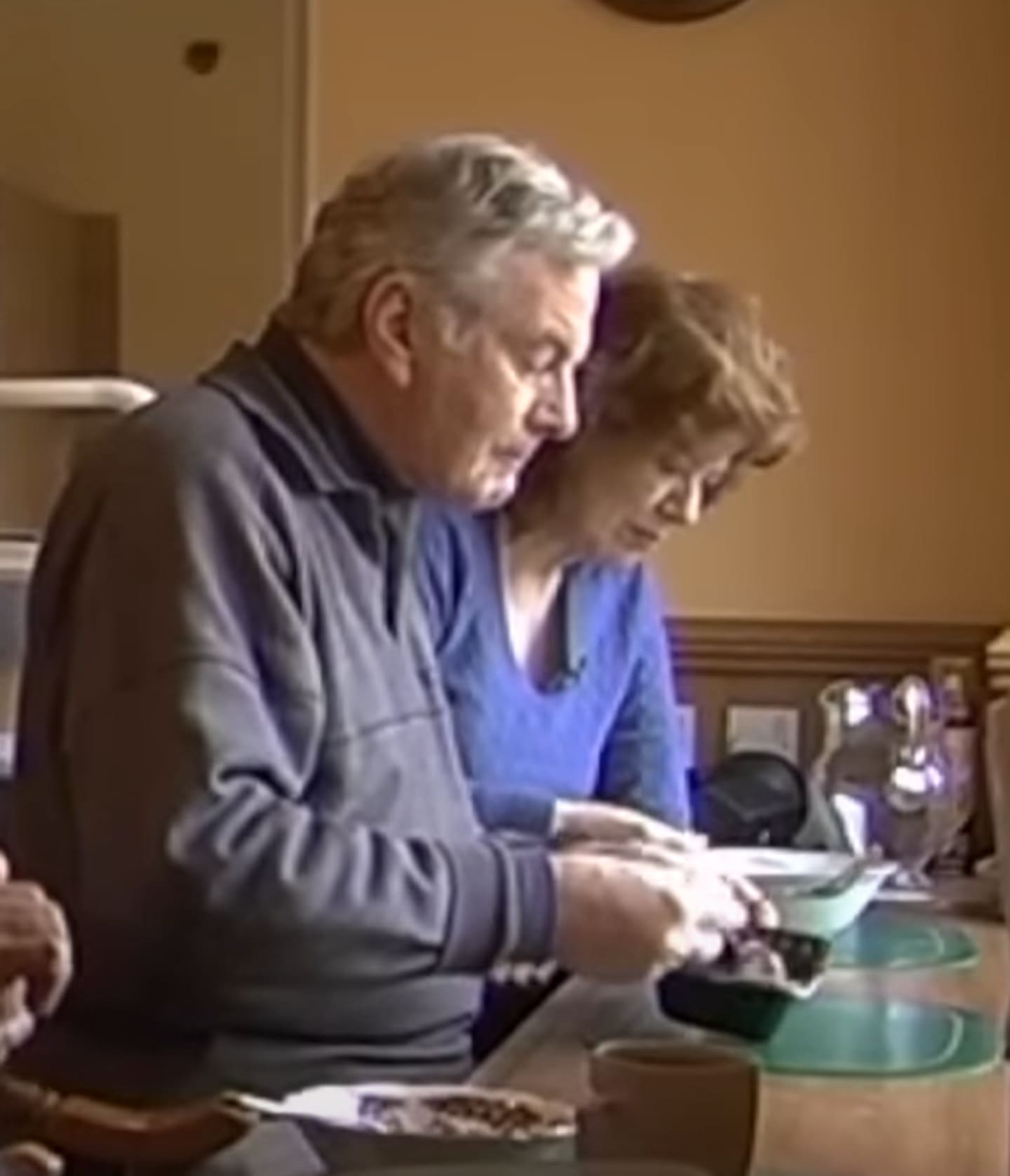 Jonathan Hulme and his sister Juliet - then known as Anne Perry - having a lunch break together. Photo / Screenshot from Anne Perry Interiors
Jonathan Hulme and his sister Juliet - then known as Anne Perry - having a lunch break together. Photo / Screenshot from Anne Perry Interiors
No remorse, no understanding and a fragile hold on reality
Jonathan never saw real remorse from his sister and any regret was not around the murder, but the consequences.
“She admitted that what she had done was wrong. And she admitted that it was right that she was sent to prison. I do not remember her, at any time, expressing much remorse,” he said.
“I think she was just captured by the moment - it was all rather jolly, I don’t think she really understood the seriousness of what she was doing.
“When it came to the trial, the giggling and whispering and flirting and nodding to each other in court ... That showed that the seriousness of what had happened and the seriousness of where they were at escaped them.”
Jonathan is in no doubt his sister should have been found not guilty by reason of insanity, adamant she was severely unstable at the time of the murder and remained unstable for the rest of her life.
“It was a classic psychosis ... My sister’s fragile hold on reality remained … at times, she was a bit naive, gullible, gauche, a bit over the top ... narcissistic,” he said.
“My sister had a gifted imagination, she ran on high-octane emotions and she loved to invent and create. In the right environment. That is good … in writing, that is what made her successful.
Anne Perry, formerly known as Juliet Hulme, at her home in Scotland. Photo / Express Syndication
“And in the the wrong environment, with a toxic influence, she was running insane … The end result is there were two people who found each other and it spiralled off into a psychotic, murderous climax.
“She had a fragile hold on reality - and most people respected that. But when it becomes malignant as it did in relationship with Pauline, you end up with a murderer.”
Jonathan firmly believed Juliet and Pauline were the victims of a miscarriage of justice - mainly due to the judge’s summing up and the pressurised verdict.
“He pushed for a verdict of guilty. He was not prepared to accept insanity .... managed to dismiss the florid, flagrant, psychotic behaviour of these two young people,” he said.
“To him, they were evil but they were not mad. They were evil, and always would be.”
He asked the Herald to look into whether the trial outcome could be retrospectively adjusted to reflect the girls’ mental states.
Two legal experts said the task was near impossible - and even if Jonathan could find a way to get the case back before a judge, it was not in the public interest.
Jonathan will never make excuses for his sister’s brutal actions or minimise her offending, and has always felt deeply for the Parker family.
But he felt compelled to speak up after his sister died.
“There is much to be learned, and mistakes to be acknowledged, not to cast blame, but to get it right next time - as surely there will be a next time,” he said.
“One popular misconception about my sister, because she was very bright, and knowledgeable, people thought she was the forceful one and prime mover in relationships. Not true.
“She had that fatal flaw, vulnerability, fear of being rejected, that always granted the other person dominance. True in the case of Pauline, and other relationships that I witnessed later.
“My sister tried hard to make amends ... none of us is perfect. I think my favourite quote from Oscar Wilde sums it up best: ‘Every saint has a past, every sinner has a future’.”
This article was originally published on the NZ Herald here.
Take your Radio, Podcasts and Music with you









